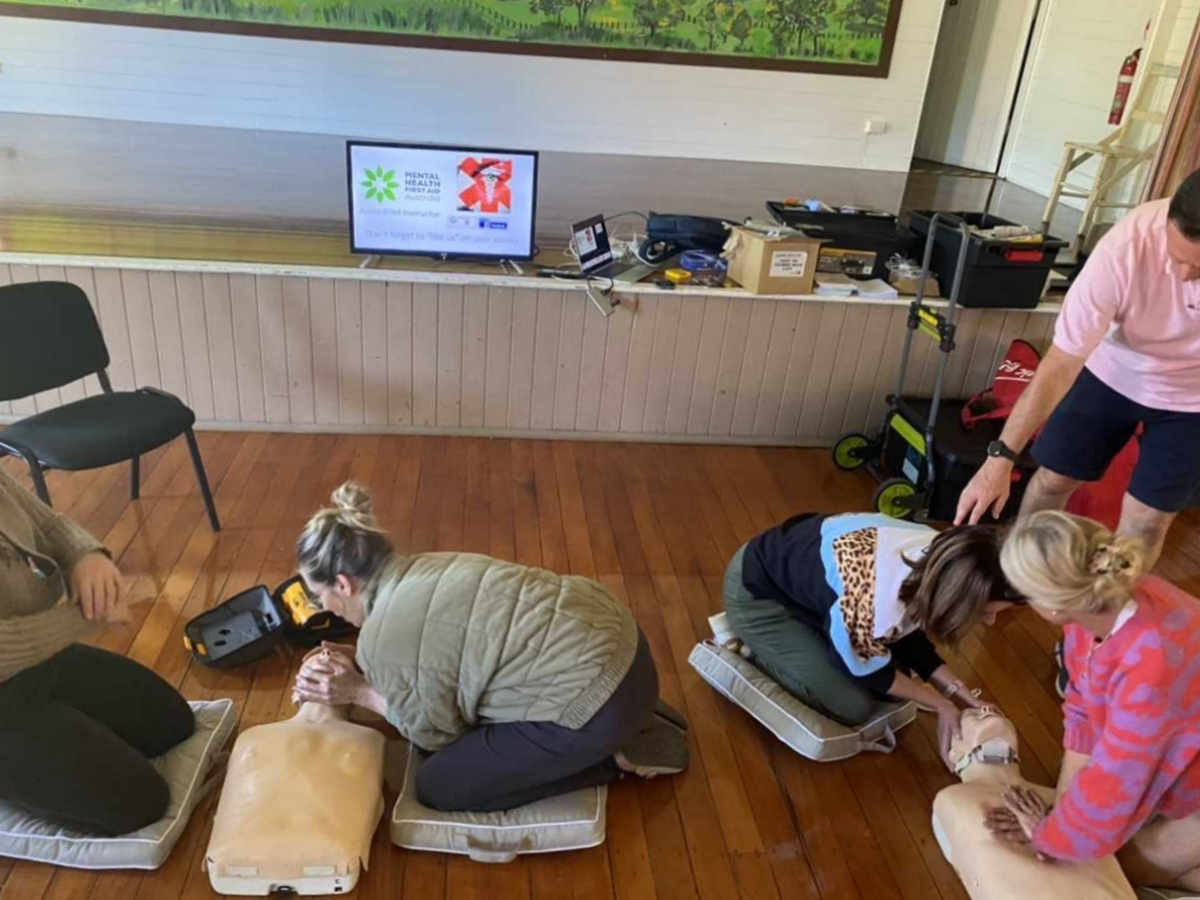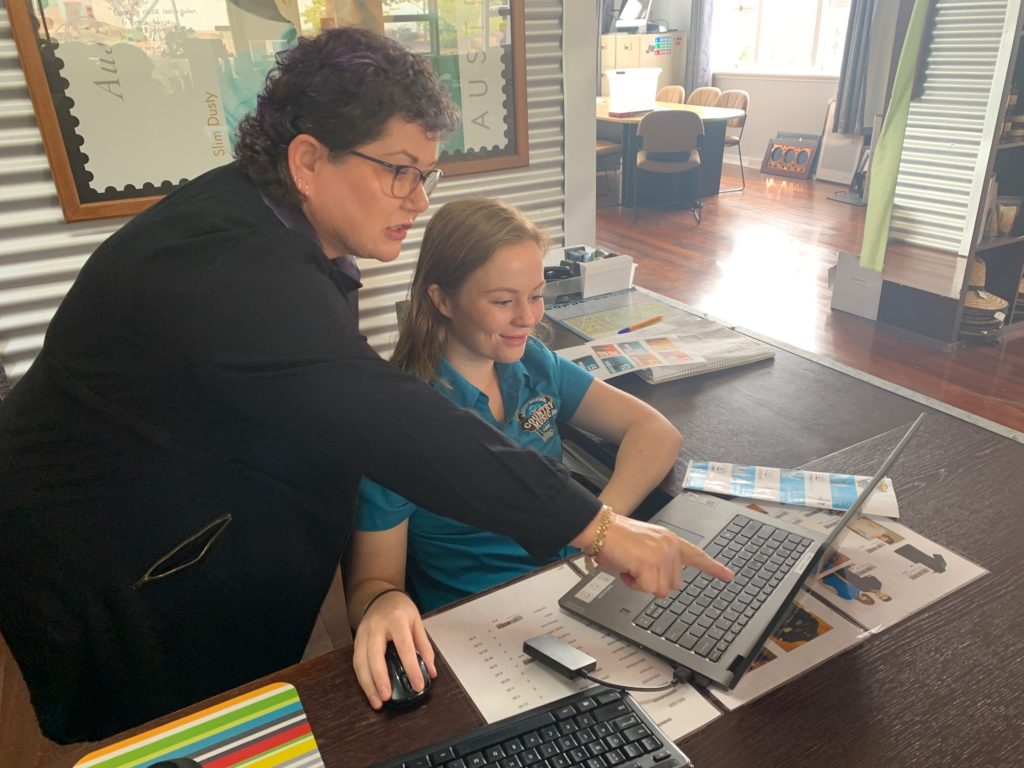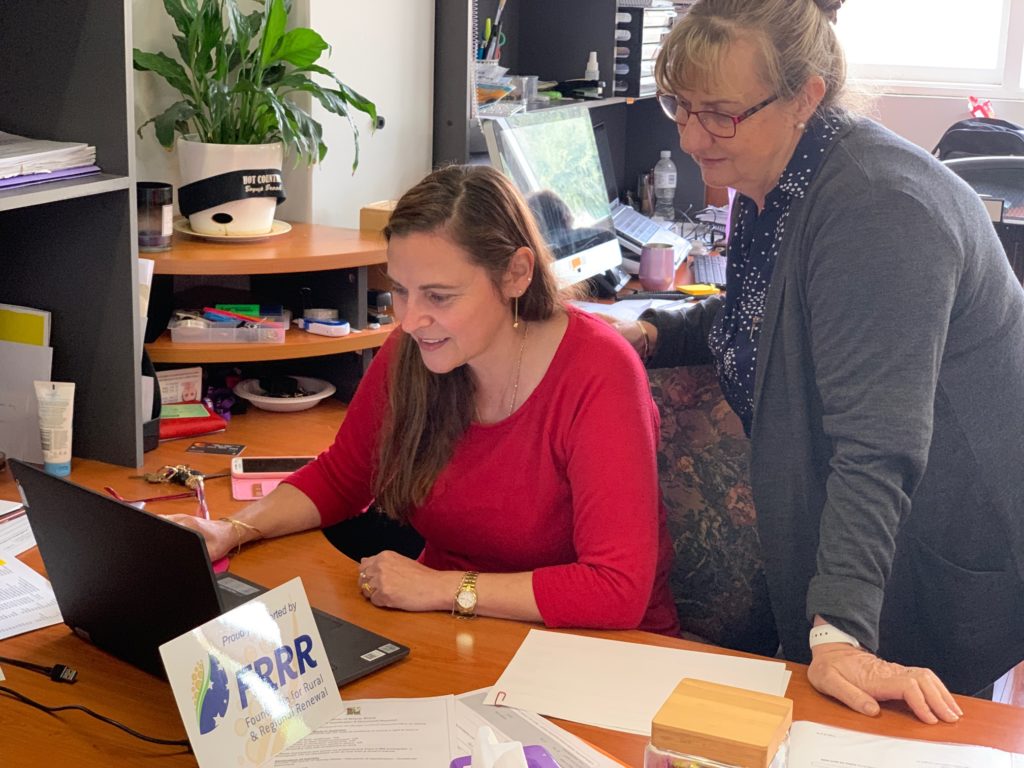Foundation for Rural & Regional Renewal (FRRR)
Following the February 2022 floods and the devastation experienced by community members within and surrounding Kin Kin, in southern Queensland, the Kin Kin Community Group (KKCG) shifted its focus towards future planning and the inevitable impacts of another natural disaster on their community. They aim to be better prepared with improved emergency systems to enable their people to operate more efficiently and effectively.
Kin Kin is a secluded southern Queensland hinterland community situated in the Noosa Council area, near its boundary with the Gympie Council. The town has very limited essential services, with only a single general store and café. The February 2022 floods took the town by surprise and left the community fending for themselves. There was no community-friendly meeting place or emergency response centre and the community was cut off by floodwaters for days. No one could enter or leave except by a helicopter from the oval. Food supplies depleted rapidly and communication was hampered, leaving the community in the dark about the ongoing situation. For four days there was limited telecommunication, making the community members feel even more isolated.
KKCG is dedicated to representing and promoting the Kin Kin community, and it was to this organisation that the community turned during their time of distress. The Group operates on behalf of the community, seeking opportunities, positive change and growth for its people. The volunteers are doing all that they can to ensure the community is prepared and supported for the future.
The effects of the 2022 flood events underscored the need for an Emergency Response hub, a place where volunteers and community can gather, to connect, communicate and plan together. The situation also highlighted the scarcity of resources available to support volunteers, including drinking water and first aid equipment. It emphasised the community’s risk areas and disadvantages, illustrating the need for better preparedness in the future.
Fortunately, the KKCG received a grant of $25,000 from the Rebuilding Futures program, funded by the Suncorp Group. This enabled the KKCG to purchase equipment and carry out activities to enhance the community’s safety, connection, resilience and wellbeing. This includes establishing a community hub that is publicly accessible at all times, including during natural disasters, and serves to provide comfort, connection, safety and distribution of essential resources within the community.

Specifically, the funds went toward essential office equipment such as computers, phones, an air conditioner, a printer, WiFi, first aid kit, a defibrillator, an emergency water supply and a community noticeboard. These resources aid in improving communication and growth within the community. The notice board displays disaster information and preparedness material from the Council and the Queensland Government, designed to better inform the community about disaster preparedness strategies. Furniture was also purchased, to make the space usable for community workshops and events that foster wellbeing and community connection. A recent example of such an event was a free first aid training day hosted by the KKCG. This workshop equipped volunteers with the skills to use the new first aid equipment and defibrillator in case of an emergency.
To combat volunteer fatigue and acknowledge the efforts of the Kin Kin volunteers, a ‘Volunteer Care Program’ was established. This program involves a monthly wellbeing initiative, allowing volunteers and community members to come together and connect. It bolsters the resilience and spirit of the community, fostering a sense of belonging and readiness to support others in times of need. The Community Hub is now equipped to meet the needs of the community in times of distress, with essential community resources and communication strategies focussed on supporting the overall health and wellbeing of the community. The hub, and volunteers who dedicate their time there, ensure that the local people, environment, culture and celebrations are embraced, fostering goodwill and prosperity. Indeed, it is the people and volunteers who have made Kin Kin an even more appealing and positive place to live.
In 1979, an idea was formed between a bunch of country music loving mates over a few drinks around a campfire in the south west of WA. It became the Country Music Club of Boyup Brook (CMCBB), and before long, they were putting on a show on a regular basis.
Since 1986, the Boyup Brook Country Music Festival has been a major drawcard for this small farming community, attracting more than 10,000 visitors. The CMCBB does a lot more than put musicians on a stage though – there is a strong commitment to upskilling and training it’s volunteers and trainees in all aspects of event planning, including administration, bookkeeping, budgeting, grant writing, event management and office procedures, supporting them to gain financial literacy and job readiness skills. This benefits a core group of 20 volunteers that contribute to pre-planning throughout the year, and 150 during the Festival weekend. The Festival also provides the main fundraising event for more than 36 local community groups that participate during the weekend.


A couple of bad years recently set the club back: in 2017, flooding required the festival to be relocated; and in 2018 the club was hit by a sophisticated ticket scamming operation. On top of all this, the IT equipment available to the group was ageing and unreliable, often freezing unpredictably. Two of the computers were classed as ‘vintage’ by Apple, and the club said they could take a “very long time before they decide to boot up and one makes a noise like crickets are in the building.” This hurdle was adversely affecting the efficiencies and upskilling of the core group volunteers, not to mention the security of ticket sales and smooth running of the festival. But the tough luck the Club had run into had affected their capacity to invest in new equipment.
Daly and Sharon Winter, CMCBB’s President and Music Director, say the Festival helps a small rural community build a vibrant and sustainable community.
“It has wider audience appeal with a multiplier effect for injecting new capital into the local economy, and improves financial well-being within our community. The Festival is a celebration of our country lifestyles and community spirit. The event encourages hundreds of visitors to our state, providing a great boost to our tourism.”
Through the ANZ Seeds of Renewal program, the Club was successful in gaining new equipment. Via the Lenovo stream of the program, the Club was delivered three new Lenovo Thinkpads to support the events future operations, productivity and skill development of the group and volunteers.
The Club also plans to train staff and volunteers to scan, edit, and save photographs and documents to preserve its history as one of the oldest Incorporated Country Music Clubs in Australia and Western Australia.
Some of the volunteers use the equipment throughout the year, and under the guidance of the committee a young employee of the club recently completed her Certificate II and III in Business, plus Event Management modules. In their report, the Club wrote: “Learning new skills through the Club has led past volunteers to new employment options and keeps people living within our rural town and region.”
Nicki Jones, a volunteer, was ecstatic when the new laptops arrived, and with them, she says she achieved much more than she anticipated.
“Not only were they efficient, user friendly and supported current applications, they had a webcam and sound! This might initially sound silly, but in the big picture, this allowed me to join webinars and learn new software packages and how to use the computer to better capacity. I found one of the new software packages extremely useful and have now produced several documents with it for the Club. These documents are up to date, professional and easy to read.”
The experience and access to technology, she said, has built her self-esteem and confidence, and she has since been successful in seeking full-time employment, bringing her new skills to her position.
“I cannot thank FRRR and ANZ enough for making life so much easier.”

